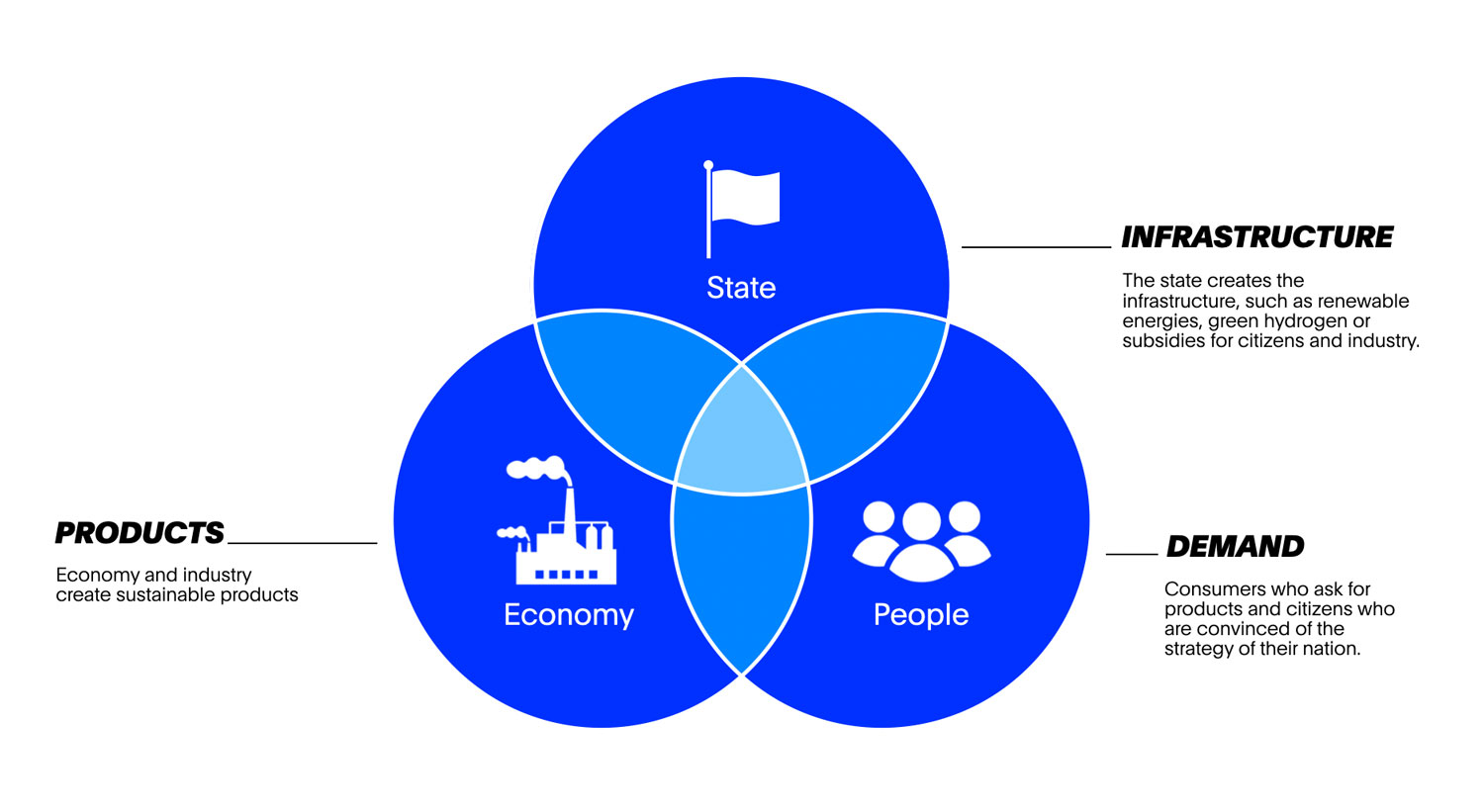How Advertising can help to save the world.
written by Benjamin Vogel
How to create a green economy to become carbon neutral in less than 30 years.
Not a month goes by without a sad new record. Forest fires, rising temperatures and melting ice caps. If you read the newspaper it seems all hope is lost.
Just last week it was announced that November was the hottest in history.
To solve the climate crisis, most countries in the world have claimed that they would be carbon neutral by 2050 at the latest. And though that may sound like a long period of time, it’s merely 30 years from now. Less than 30 years to find concepts and developing infrastructures and products for more than 7 billion people on this planet to live a carbon neutral life. No doubt this is one of the most challenging projects humanity has ever faced.
So, the question is how do we get there?
Fortunately, nations, businesses, NGOs, startups, etc. around the world are working flat out to find solutions. And there won’t be just one concept, but many that will bring us closer to a zero emissions world. But no matter the concept, startup or idea, they all have one challenge in common. People have to want it. The majority have to want it. There has to be a demand for such solutions.
For example: The citizens of a nation have to be convinced about the strategy of their government. Consumers have to be excited about this new electric car. People have to choose environmentally friendly products over regular products, despite them costing a bit more. And this demand has to be created; it doesn’t happen by itself. We are living in an oversaturated world. We have more choices than ever before. As Nicola Mendelsohn, Head of Facebook Europe, put it:
“It is becoming more important to create demand than to satisfy demand.”
We will succeed in becoming carbon neutral if three things come together at the same time. States providing the necessary infrastructures. The Economy creating sustainable products and people asking for them — the demand.

Source: Stefan Bauernberger | Benjamin Vogel
Take electric cars, for example. One of the top reasons against electric cars is the lack of power outlets. There may be a demand and a choice of electric cars, but the lack of infrastructure for a sufficient charging network is not allowing this technology to take off.
And while we’re working on products and infrastructure, the real question is: How do we create demand for these products and strategies? How do we convince people to want this kind of product?
Creating demand based on Logic
Perhaps you now come up with the objection that this is the climate crisis, and that people are acting sensibly. In other words: logical. But this is a common misunderstanding; the notion that we will solve this with rational decision making. Humans are everything but rational.
Just think about the year 2020. It is the year of renunciation. Refraining from touching each other, refraining from unnecessary travel, contact restrictions, etc. We are in a pandemic; one of the greatest global crises in recent human history. A vaccine is now in sight. The period of restriction is manageable. We know what to do to protect ourselves until then. But yet so many people do not follow the recommendations; The recommendations of science.
And we don’t need a pandemic to exemplify this. Just think about your personal life.
Take one minute to count all of the rational and emotional decisions you made today. I bet there are more times that you acted on emotion over rationality.
We’re not acting with logic. We never have. If we did, we would take more care of our bodies, eat healthier, learn new skills, and so on. In theory, we know what is good for us. We know the facts. But that doesn’t mean we act on it.
And even if we did do logical things all the time we still wouldn’t be on the same page. Not everyone believes in facts. A recent study shows 30% of the population of Germany believe in conspiracy theories. Or take the recent US election. 70% of the Republicans think that it was rigged, and the election wasn’t fair, even though there is no evidence for it.
The sad truth is that facts don’t mean anything these days. It’s not a good decade for facts. Logic doesn’t work.
If this doesn’t work, what can we do instead?
If you want to take a look into the future, it makes sense to look over your shoulder to see where you came from.
Since the beginning of industrialization, the temperature on earth has risen by around 1%. Humans have released more than 1.5 Trillion tons of carbon emissions into the atmosphere. More cars, bigger houses, more appliances, and more energy to use it. Travel to faraway countries. Sometimes several times a year. It is mass consumption that puts us in this situation. And advertising fuels it.
When companies started to reproduce products in factories and not manufacture them as individual objects, and this resulted in growing competition and has continued to this day. From a regional marketplace to an international marketplace that is determined by supply and demand. And the only way to survive in this marketplace is, besides being more innovative, to promote your own products better. And that’s exactly why advertising was invented. It helped companies sell products to a larger audience. It helped to create a demand. The demand not based on logic, but desire.
Since then, advertising has been on a triumphant advance. It was the clever tricks of creative minds that turned simple product descriptions into inspiring messages. It was advertisers who, with their crisp headlines, shiny advertisements and their sales psychology, seduced people into wanting more and more. More than we actually need. And of course, we continue to do so. Even more today than in Mad Men’s time. Today people see advertising messages more than ever in history. The battle for attention has never been greater than it is today.
Our society is built on the concept of consumption. And of course, there are movements that point this out: “You don’t need everything! Buy locally! Don’t travel that much! And so on.”
And they have a point. In theory, this is true. But this is the concept of renunciation. The contrary to how our generation, that of our parents and also of those who came after us, were raised. It would mean a massive behavior change. Especially for industrial nations. China, the US and the European Union together are responsible for more than 50% of all global emissions. And now developing countries want to become rich too. So, it is unlikely that we will give up the concept of consumption anytime soon.
It was advertising that got us to this point. And it is advertising that will take us away from it again.
To achieve our goal to be carbon neutral by 2050, we must create a green economy that puts green products first. A green industrialization.
It doesn’t matter whether it is an industrial nation or a developing country. The idea of a growing economy and consumption will not stop, but we can decide in which direction to steer it. We can increase the focus. And that’s what advertising does. Advertising steers.
Advertising does not convey any information. Advertising gives a feeling. It seduces. It doesn’t inform. We have enough information about climate change and its dangerous effects. Now we have to seduce consumers to buy climate friendly products.
Advertising creates emotions. And emotions are key for change. I don’t talk about the “Get your 5% discount today” commercials. I talk about the epic campaigns that give brands a soul. About inspiring narratives that help NGOs to raise money. Stories told by brands, that everyone can achieve everything. This is purpose driven communication. This kind of advertising is about hope. And that’s the narrative we need to achieve our goal to become carbon neutral by 2050.
And we’re already on the way.
According to the 2020 Edelman trust report, 64% of people expect brands to act. They also think that brands are also more likely to have a vision for the future and bring change than national governments. 74% of Employees said that CEOs should take the lead on change rather than waiting for the government to impose it.
The expectations are already there. Now it’s about developing brand and communication strategies to convey this responsibility. Creativity is a superpower. Used well there are enormous possibilities and a real chance that we will become carbon neutral by 2050.

Benjamin
Vogel
Founder & Managing Director
Berlin
Benjamin is the founder and managing director of Nayture. His focus is communication and brand strategy. Over the past few years he has worked with political leaders and major brands from various industries on campaigns, strategies and purpose projects. He believes that brands have tremendous social power that can be harnessed for sustainability efforts.